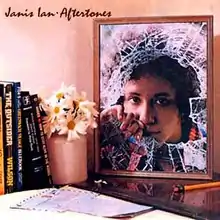Aftertones
Aftertones is the eighth album by American singer/songwriter Janis Ian, recorded 1975 in various New York studios and released 1976 by Columbia Records. "Love Is Blind" was a #1 single in Japan for six months. It was the highest-selling album by a solo female artist in Japan and was also a top twenty and gold record in the United States, Ireland and Holland.[5] "I Would Like to Dance" reached #86 in Canada.[6]
| Aftertones | ||||
|---|---|---|---|---|
 | ||||
| Studio album by | ||||
| Released | 1976 | |||
| Recorded | late 1975 | |||
| Studio | Record Plant, New York City | |||
| Genre | Adult contemporary | |||
| Length | 33:11 | |||
| Label | Columbia | |||
| Producer | Brooks Arthur | |||
| Janis Ian chronology | ||||
| ||||
| Review scores | |
|---|---|
| Source | Rating |
| AllMusic | |
| Christgau's Record Guide | B−[2] |
| Wilson and Allroy | |
| Rolling Stone Album Guide (1992) | |
Track listing
All tracks are written by Janis Ian
| No. | Title | Length |
|---|---|---|
| 1. | "Aftertones" | 3:13 |
| 2. | "I Would Like to Dance" | 3:41 |
| 3. | "Love is Blind" | 2:16 |
| 4. | "Roses" | 3:11 |
| 5. | "Belle of the Blues" | 4:31 |
| Total length: | 16:52 | |
| No. | Title | Length |
|---|---|---|
| 1. | "Goodbye to Morning" | 3:08 |
| 2. | "Boy I Really Tied One On" | 2:43 |
| 3. | "This Must be Wrong" | 2:42 |
| 4. | "Don’t Cry, Old Man" | 3:58 |
| 5. | "Hymn" | 4:09 |
| Total length: | 16:40 | |
Charts
| Chart (1976) | Peak position |
|---|---|
| US Billboard 200[7] | 12 |
| Australian (Kent Music Report)[8] | 45 |
| Canada (RPM (magazine)[9] | 81 |
Personnel
- Janis Ian – vocals, guitar, piano
- Jeff Layton, Al Gorgoni, Bucky Pizzarelli – guitar
- Stu Woods, Richard Davis – bass guitar
- Barry Lazarowitz – percussion
- Arthur Jenkins – congas
- Claire Bay, Brooks Arthur, Odetta, V. Martin Fink – vocals
- Phoebe Snow – obligato vocals on "Hymn"
- Larry Spencer, Pete Nater, Tom Malone, Ernie Royal, Joe Shepley – trumpet
- Mickey Gravine, Lewis Kahn, Wayne Andre – trombone
- Donald Corrado, Earl Chapin, Jim Buffington – French horn
- Charles McCracken, Jesse Levy, Bruce Rogers, Kermit Moore, Max Hollander – cello
- Ezra Kliger, Gene Orloff, Julius Schacter, Kathryn Kienke, Harry Cykman, Harry Lookofsky, Michael Comins, Paul Winter – violin
- Emanuel Vardi, Eugenie Dengel, George Brown, David Sackson, Jennifer Ward Clarke – viola
- Gonzalo Fernandez – wooden flute on "I Would Like to Dance"
- George Young – tenor saxophone on "Belle of the Blues"
- Artie Kaplan – baritone saxophone on "Belle of the Blues"; bass clarinet on "Don't Cry, Old Man"
- Phil Bodner – oboe, alto flute, English horn on "Goodbye to Morning"
- Romeo Penque – oboe, alto flute, piccolo flue, English horn on "Goodbye to Morning"; contrabass clarinet on "Don't Cry, Old Man"
- Mike Gibson – arranger, conductor on "I Would Like to Dance"
- Jerry Ragovoy – arranger, conductor on "Belle of the Blues"
- Ron Frangipane – arranger, conductor on "Don't Cry, Old Man"
Production
- Produced by Brooks Arthur
- Album photography: Peter Cunningham
- Album design: David L’Heureux
External links
References
- Planer, Lindsay. "Aftertones – Janis Ian". All Music. Retrieved September 17, 2021.
- Christgau, Robert (1981). "Consumer Guide '70s: I". Christgau's Record Guide: Rock Albums of the Seventies. Ticknor & Fields. ISBN 089919026X. Retrieved February 27, 2019 – via robertchristgau.com.
- Wilson, David Bertrand. "Aftertones – Janis Ian". Wilson and Allroy’s Record Reviews. Retrieved September 17, 2021.
- DeCurtis, Anthony; George-Warren, Holly and Henke, James; The Rolling Stone Album Guide – Completely New Reviews: Every Essential Album, Every Essential Artist, p. 339 ISBN 0679737294
- "Janis Ian - American songwriter, singer, musician, author and multiple Grammy-winning writer of "At 17," "Jesse" and "Society's Child": Listening Room: Aftertones". Archived from the original on 2014-02-26. Retrieved 2014-02-22.
- "RPM Top 100 Singles - June 12, 1976" (PDF).
- "Janis Ian Chart History (Billboard 200)". Billboard. Retrieved September 26, 2021.
- Kent, David (1993). Australian Chart Book 1970–1992 (illustrated ed.). St Ives, N.S.W.: Australian Chart Book. p. 145. ISBN 0-646-11917-6.
- "RPM Top 100 Albums - April 7, 1976" (PDF).
This article is issued from Wikipedia. The text is licensed under Creative Commons - Attribution - Sharealike. Additional terms may apply for the media files.